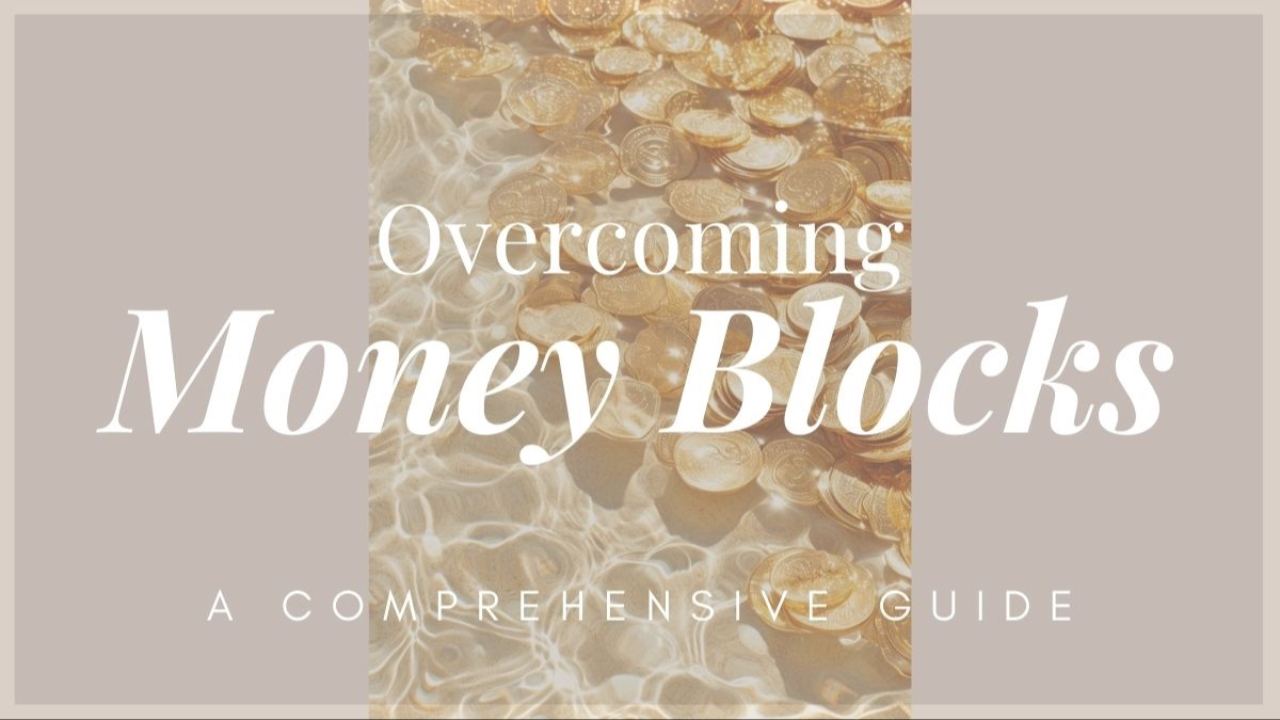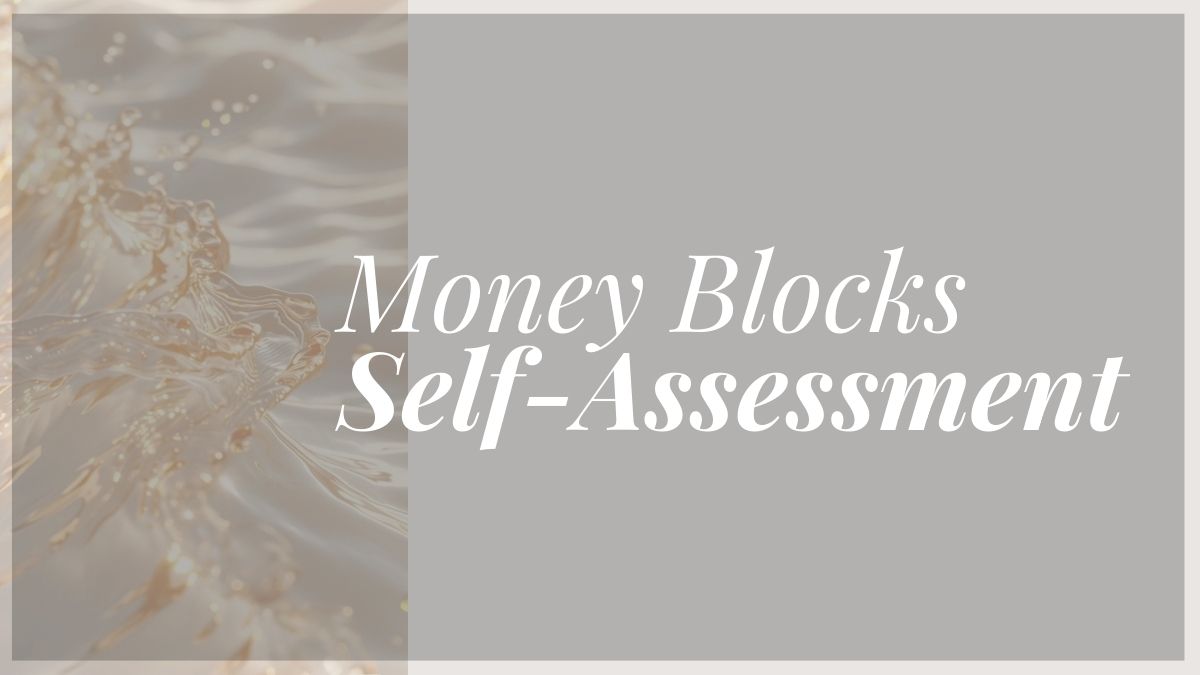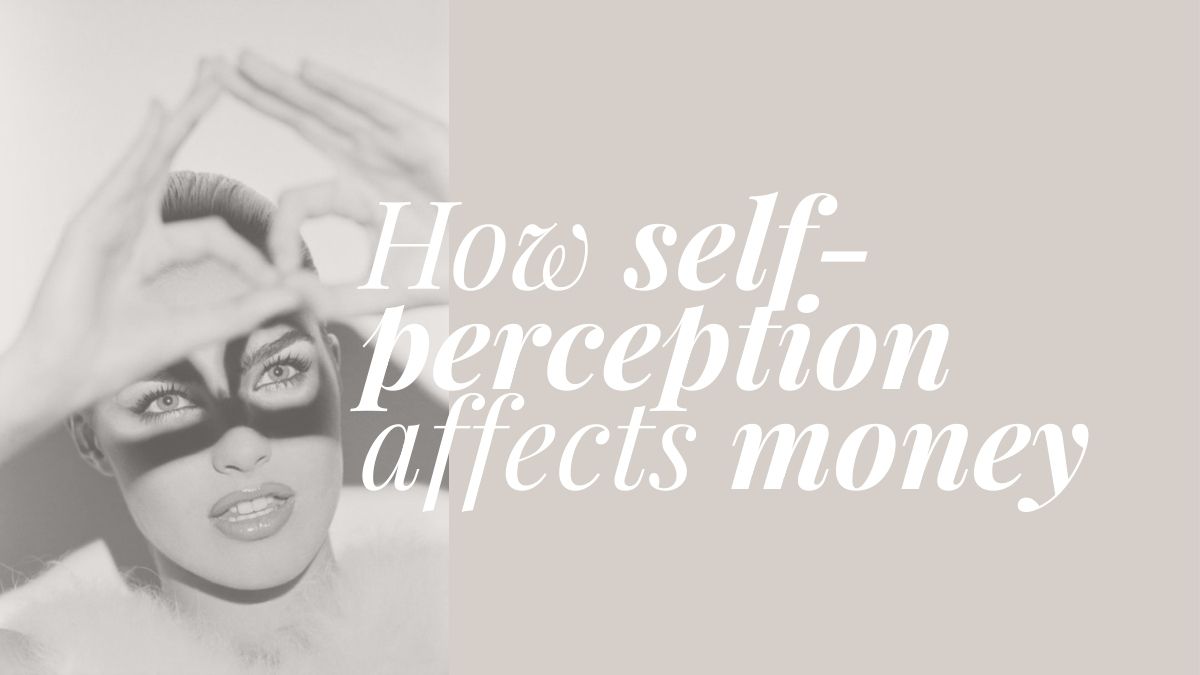How to Break Money Blocks: Rewire Worthiness, End Scarcity, Grow Wealth

In a world that glorifies hustle and productivity, many high-achievers feel stuck in the same cash-flow loops — working hard, undercharging, over-delivering to stay competitive, avoiding the “money stuff,” feeling depleted when checking the bank account, and jumping straight back to the grind to make more.
There's nothing wrong with working hard and being disciplined. But most “money problems” are not the result of not working "hard enough."
Self-sabotage in finances is often a direct manifestation of underlying money blocks (which you might not be aware of), and overcoming them requires addressing the root emotional and psychological causes behind these blocks, which sit at the intersection of nervous-system safety, self-worth, and subconscious beliefs.
This guide walks you through awareness → regulation → belief rewiring → simple money systems so that you can earn, receive, and hold more with ease.
What Are Money Blocks?
Money blocks are subconscious beliefs and behavioral patterns around earning, receiving, spending, and holding money.
They are predominantly shaped by our childhood conditioning:
- Family Modeling & Culture
What you heard about “people with money” or what “good people” do - Financial or Relational Trauma
Instability, debt, sudden loss, shame - Identity & Social Context
Gender norms, ancestral narratives, systemic pressures

The most common money blocks (financial self-sabotage) that keep people stuck:
- Compulsive Saving or Spending
Either extreme can create financial imbalance, such as hoarding money out of fear or overspending without control. - Negative Beliefs about Money and Wealth
E.g., “wealthy people aren’t honest,” “money is the root of all evil,” or “I don’t deserve to be wealthy.” - Low Self-worth and Feeling Undeserving
Feeling unworthy of success or financial abundance holds people back from pursuing opportunities. - Procrastination
Delaying money-related decisions or tasks prevents progress and growth. - Fear of Failure or Success
Worrying about potential negative outcomes or feeling overwhelmed by success leads to self-sabotage. - Difficulty Managing Money
Thoughts like “I’m not good with numbers” discourage taking financial control. - Guilt Around Money
Feeling guilty about earning, spending, or gaining wealth can block abundance. - Avoidance and Denial
Ignoring finances and investments or pretending problems don’t exist causes ongoing struggles. - Self-sabotaging Behaviors
Overspending, gambling, or other destructive habits directly reduce financial stability.
Money blocks not only limit financial success but also create anxiety, stress, and a lack of peace around financial matters.
Overcoming these blocks requires awareness, mindset shifts, and practical financial habits to build confidence and create sustainable financial well-being.
How Money Blocks Show Up In Business

- Underpricing & Scope Creep
Buying approval with discounts or extras. - Delayed Money Tasks
Invoices late, taxes avoided → fees + stress. - Risk Extremes
Frozen (no investments) or chaotic (over-leveraging). - Feast or Famine Sales Cycles
Sprint → crash → avoidance → sprint.
Do I Have Money Blocks? (Signs)
The emotional and psychological signs show how deeply money blocks can affect your sense of security, self-esteem, and well-being, often rooted in subconscious beliefs and past experiences around money.
Addressing them with awareness, mindset work, and practical financial habits is key to clearing money blocks and creating a healthier relationship with money.
EMOTIONAL
- Anxiety when checking your accounts
- Guilt around receiving money, gifts, or compliments
- Dread around pricing
- Hesitation before spending (even when it's justified or needed)
- Feeling jealous or resentful towards others' financial success
BEHAVIORAL
- Procrastinating on billing/taxes/investing (financial tasks)
- Adding “free extras” or over-giving
- Impulse spending
- Avoiding or getting triggered by conversations around money
FINANCIAL
- Thin cash buffer
- Irregular sales
- Not paying yourself
- No clear payment terms

(Yes/No) Self-Assessment
- I often discount or add extras to my products or services. (Some part of me feels like I don't deserve wealth)
- I delay invoices or work proposals.
- I resist change or opportunities that could improve my finances.
- I feel guilty or uncomfortable spending on myself and enjoying my success.
- I avoid looking at the numbers. (Procrastination on financial tasks or decisions, avoiding dealing with money matters)
- I panic when money arrives or leaves. (Constant worry or anxiety about money and finances)
- I feel like there's an invisible income ceiling I can't break.
(Not making as much as you've planned for, or consistent difficulties with setting and reaching your financial goals) - I have difficulty saving money. It's like I'm stuck, unable to get ahead or increase my finances.
- I have low confidence in my ability to increase my income and/or feel like I have to work harder to earn more.
-
I have a fear of failure or fear of success related to financial achievements.
- I overspend or gamble when I have money.
→ If you answered 'yes' to three or more of these statements, you likely have money blocks.
Worthiness & Wealth: Why Self-Value Drives Cash-Flow

Beneath most money blocks sits a worthiness wound: Do I deserve to be seen, paid, supported? When the nervous system equates visibility with danger, you’ll price low, overdeliver, settle for less, or avoid selling.
It is imperative to work on your self-worth, shift your perception to see wealth as connected to you (not separate), and change the limiting beliefs around deserving money and abundance to overcome your money blocks.
Feeling worthy allows money and prosperity to flow more freely to you. This connection is both psychological and energetic, involving how you perceive yourself and your relationship with wealth.
Reframes to try:
- “Price is a boundary, not a personality test.”
- “Receiving is how I sustain the work.”
- “My rates reflect value, scope, and capacity—not my worth.”
Scarcity Mindset vs. Abundance Mindset
A scarcity mindset is a way of thinking where you focus intensely on what you lack, believing that resources — such as money, time, or opportunities — are limited and insufficient for everyone. This mindset creates tunnel vision, making it difficult to see possibilities or abundance outside of what feels scarce. It often leads to stress, anxiety, and poor decision-making because your attention is consumed by the fear of not having enough.
How scarcity mindset affects money blocks:
- Focus on Lack
You become fixated on what you don't have, which reinforces feelings of deprivation and financial anxiety. - Short-Term Thinking
A scarcity mindset often drives decisions aimed at immediate survival or coping, rather than long-term financial health, causing missed opportunities for growth or investment. - Fear and Stress
Constant worry about money shortage increases stress, which can impair clear thinking and lead to reactive or impulsive financial behaviors. - Jealousy and Competition
Believing money is limited can foster resentment or envy towards others' financial success instead of collaboration or learning. - Self-Sabotage
The mindset can lead to behaviors that block financial progress, such as procrastination, avoiding money management, or underselling your abilities. - Limits Abundance Mindset
A scarcity mindset prevents you from embracing the belief that there is enough money and opportunity for everyone, which is essential for healthy financial growth.
In summary, a scarcity mindset fuels and reinforces money blocks by keeping your attention on limitations and fear, rather than possibilities and abundance. Shifting to an abundance mindset can help dissolve money blocks and open pathways to financial well-being.

An abundance mindset improves financial health in several important ways:
- Focus on Possibilities and Growth
Instead of fixating on scarcity or limitations, an abundance mindset helps you see potential in your current resources, skills, and opportunities. This perspective encourages creative solutions, smarter investments, and new income avenues. - Reduces Financial Anxiety
By focusing on gratitude and what you already have, you alleviate the stress and worry often caused by scarcity thinking. This creates a healthier emotional relationship with money. - Encourages Risk-Taking and Investment
Believing that there is enough wealth to go around makes you more willing to take calculated risks, such as starting a business or investing, which can grow your wealth over time. - Promotes Sustainable Financial Habits
With an abundance mindset, you prioritize consistent saving, budgeting, and skill development over impulsive or fear-driven financial decisions. - Builds Resilience and Adaptability
Viewing challenges as temporary and opportunities for growth helps you stay motivated and adjust your financial strategies when needed. - Enhances Generosity and Collaboration
Feeling abundant encourages you to share, network, and collaborate, building stronger relationships that can lead to new financial opportunities and security. - Improves Decision-Making
Gratitude and abundance reduce impulsive spending and help you focus on meaningful financial goals, reducing the chase after fleeting desires. - Creates a Positive Feedback Loop
Gratitude reinforces abundance, and abundance fosters more gratitude, creating a cycle that improves your overall financial outlook and well-being.
Ultimately, cultivating an abundance mindset helps turn your financial journey into a source of empowerment and joy, enabling better decisions and long-term wealth growth. 🌿
Resetting Four Money Block Patterns
Use these to spot your default pattern. Each includes a micro-correction to practice this week.
- Money AVOIDANCE
Belief: “Money is bad / I don’t deserve it.”
Behaviors: not opening bills, undercharging, or delaying invoices.
Micro-correction → Schedule a 15-minute Money Date to do the tasks you've been avoiding (e.g., send the invoice, log expenses, pay the bills, etc.) - Money WORSHIP
Belief: “More money solves everything.”
Behaviors: overspending, chasing revenue without margins, burnout.
Micro-correction → Before any new purchase, ask, "Will this create cash-flow or capacity for me within the next 90 days?" If not, will it ever? Think it through until you have a clear return on investment (ROI) and margin impact perspective. Give yourself a 24-hour buffer before spending. - Money STATUS
Belief: “Net worth = self-worth.”
Behaviors: comparison, performative upgrades, risky bets.
Micro-correction → Make a weekly “enough list,” focusing on 3 ways your life is already resourced and good enough. Make one values-aligned choice. - Money VIGILANCE
Belief: “It’s never safe enough to spend.”
Behaviors: hoarding, difficulty receiving, joyless frugality.
Micro-correction → Allocate 5% of any inflow to Guilt-Free Enjoyment to train your nervous system that receiving is safe. Embrace the habit of investing in yourself and your joy.
Rapid Transformational Therapy to Clear Money Blocks

Rapid Transformational Therapy (RTT) helps to dissolve money blocks effectively by working directly with the subconscious mind to identify and reprogram the root causes of limiting beliefs around money:
- Uncovers the Root Cause Quickly
RTT accesses the subconscious mind through hypnosis, where deep-seated beliefs about money are revealed. - Removes Emotional and Mental Barriers
By bringing these subconscious blocks into your conscious awareness, RTT enables you to understand and release negative emotions and mental scripts that have been holding you back financially. - Replaces Limiting Beliefs with Positive Ones
After uncovering the blocks, RTT uses personalized hypnosis and suggestion to instill new, empowering beliefs. - Creates Lasting Change at the Subconscious Level
Because most of our financial habits and attitudes are driven by the subconscious (about 95%), RTT’s approach of reprogramming this level ensures more permanent transformation than traditional talk therapy or willpower alone. - Rapid and Personalized Process: RTT achieves these shifts in just a few sessions by combining hypnosis, cognitive behavioral therapy, and neuro-linguistic programming tailored specifically to the individual’s money mindset issues.
- Supports Ongoing Reinforcement: The therapy often includes personalized hypnosis recordings to listen to for several weeks after sessions, which helps solidify the new positive beliefs and rewrite your financial mindset.
By holistically identifying and healing the subconscious emotional and mental roots of your financial struggles and implementing new behavioral changes, RTT helps you develop a healthier, abundant, and confident relationship with money. 🌿
FAQs
Why do I self-sabotage with money?
→ You likely have subconscious money blocks and protective beliefs around worthiness or safety that trigger stress. Begin by regulating your stress response (calm the body), then identify and work on changing those limiting beliefs, and implement consistent behavioral changes (doing the tasks you're avoiding).
How do I stop undercharging?
→ Get realistic about profitability and examine your pricing psychology. For example, if you're discounting, is there a clear plan or reason behind it, or are you just doing it because the competition is? Determine healthy profit margins for your product or service offer that include more than just your raw materials costs.
Can money blocks be dissolved quickly?
→ Yes, especially with a targeted approach that combines nervous system regulation, subconscious work (such as through RTT), setting up reliable money systems, and making behavioral changes to stabilize and increase your cash flow.
Is it normal to feel conflicted about wanting to be wealthy?
→ It is common to experience wealth guilt or shame (sudden wealth syndrome), where you might worry about how financial success might change your identity, values, or relationships. These feelings can lead to self-sabotaging behaviors, stress, and emotional struggles. Understanding that they are normal is the first step. Working through them helps you reconcile your desire for financial success with your values and sense of worthiness, leading to a healthier relationship with money.
Will changing my mindset about money help me earn more?
→ Yes, but indirectly and not immediately. This isn't going to "manifest" money out of the blue. It's about changing self-sabotaging behavior and thinking to help you make better financial decisions and implementing systems to grow your wealth in a grounded and sustainable way.
Can affirmations and journaling dissolve money blocks?
→ While affirmations and journaling can be helpful tools to identify, understand, and begin reframing limiting beliefs around money, these practices often need to be combined with other actions for lasting, comprehensive change (especially for deeply embedded money blocks). Additional approaches may include therapy or coaching to address the emotional and psychological roots, consistent mindset work to reinforce new beliefs, practical financial education, habit changes, and taking action aligned with your new mindset and knowledge.



